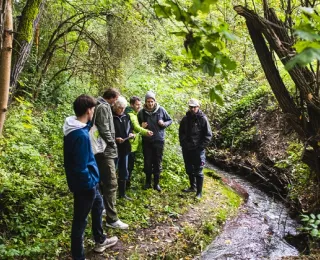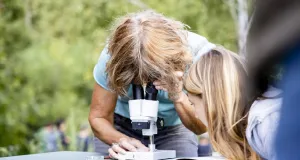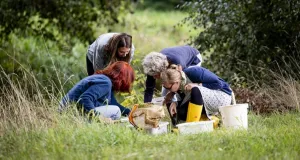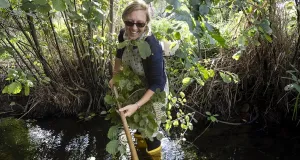FLOW – Monitoring small streams – creating knowledge together

| Federal State | Nationwide (Germany) |
|---|---|
| Duration | 01/03/2025 - 28/02/2027 |
| Funding budget | € 917,545.02 |
| Funding reference number | 1352560010A, 352560010B |
| Grant recipient | German Centre for Integrative Biodiversity Research (iDiv) Halle-Jena-Leipzig |
| Project partners | German Centre for Integrative Biodiversity Research (iDiv) Halle-Jena-Leipzig; Helmholtz Centre for Environmental Research (UFZ); German Angling Association (DAFV) |
Description
In the citizen science project FLOW, trained citizen scientists carry out standardised assessments of the status of small streams that are not, or only insufficiently, covered by official freshwater monitoring programmes. This approach complements official monitoring programmes, supports watercourse research, and at the same time strengthens public awareness of the importance and vulnerability of our streams.
The German Angling Association (DAFV) has been recruited as a project partner. This makes it possible to further expand and strengthen the volunteer network of citizen scientists, local experts, and supporting organisations nationwide. In this context, educational and public outreach activities will also be extended to additional target groups.
The funding is intended to establish the FLOW project in the long term as a quality-assured national citizen science monitoring programme for small streams. Since 2021, FLOW has been supported by the engagement of a nationwide FLOW community with more than 900 citizen scientists and, at present, 70 regional groups from environmental organisations, schools, angling clubs and other groups.
Approach
To ensure standardised data collection, processing and use by various actors from research, government agencies and civil society, the FLOW data management system is being professionally developed further in collaboration with IT specialists. Additional bioindicators will be integrated into the project to enable even more comprehensive analysis of the citizen science data.
In parallel to these activities, a large-scale follow-up project is being prepared together with the project partners. In this follow-up, local stream restoration measures will be planned, implemented and evaluated on the basis of citizen science and civic engagement.
Project structure
The project is accompanied by extensive public outreach and environmental education activities and is divided into the following work packages:
The scientific coordinator at UFZ/iDiv ensures that the monitoring is carried out professionally and, together with the volunteer coordinator at DAFV, continues to develop the training and educational materials for the FLOW project. In addition, an additional bioindicator system will be integrated into the web application.
The FLOW data management system (web application) is being enhanced by the UFZ/iDiv team with additional important features, including a web-based GIS map for visualising the results and a data quality assurance system based on photographic evidence and expert review.
The volunteer coordinator at DAFV is responsible for supporting experienced volunteer groups as well as recruiting new participants. In collaboration with the scientific coordinator at UFZ/iDiv, he organises the annual online and in-person training sessions as well as the FLOW project conferences.
The scientific coordinator at UFZ/iDiv analyses the FLOW data with the support of an assistant and presents the findings at the annual project conferences as well as at scientific meetings. The results are published in the planned Biodiversity Monitor of the Monitoring Centre and in scientific journals. This approach facilitates the integration of citizen science data into biodiversity data portals and studies, as well as their use by research institutions, public authorities, civil society actors and decision-makers.
The FLOW website is being further developed by the UFZ/iDiv team to a high standard, and is attractively maintained with regular news updates by DAFV. Through contributions in online and print media, radio, TV, association journals and briefing materials for policy and practice, the results of the FLOW project are made accessible to a broad audience.
Project benefits
Citizen science as a complement to official monitoring
A standardised citizen science monitoring programme with FLOW is of great importance for freshwater research, as it provides a complementary data basis to official monitoring. The status and human-induced stressors of small streams can thus be analysed more effectively in order to derive and implement evidence-based protection measures.
Expanding the data basis and knowledge transfer
During the planned funding period, the existing FLOW data pool will be expanded in both spatial and temporal scope. By surveying a growing number of streams across Germany, and through close planned cooperation with authorities and the Monitoring Centre, the potential for scientific use of the FLOW data will increase. Several publications are planned from the project, including contributions to the Biodiversity Monitor of the Monitoring Centre.
Additionally, the FLOW project enables greater public outreach and visibility for the Monitoring Centre and the Federal Agency for Nature Conservation (BfN) through radio, TV, print and social media channels.
Prospects for nationwide application of FLOW
In the future, FLOW could be used by government agencies as a nationwide screening programme for small streams to identify high-risk areas and as a tool for evaluating the success of ecological restoration measures. In this way, the project – together with citizen scientists and partner organisations – aims to contribute to the implementation of the European Water Framework Directive, the National Water Strategy, and the EU Restoration Law.


